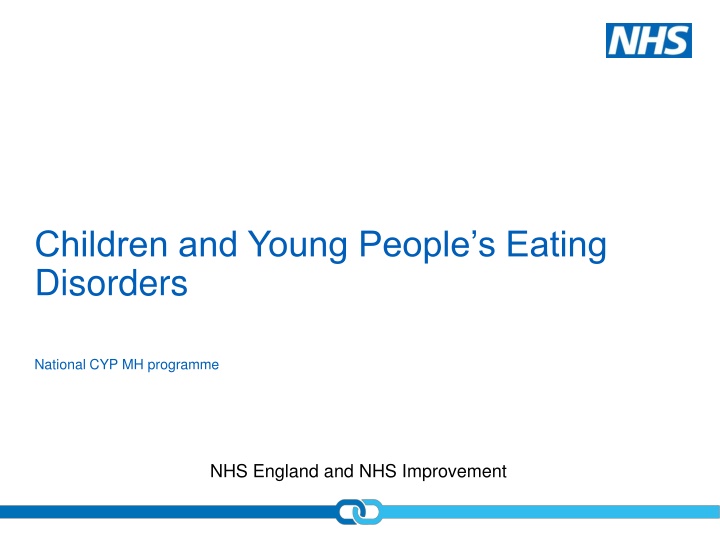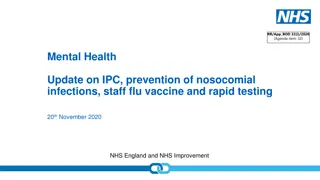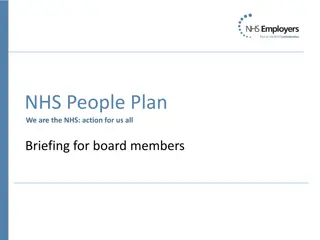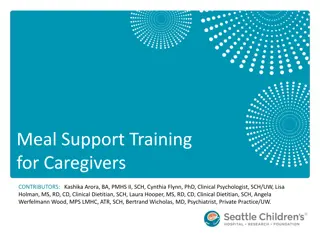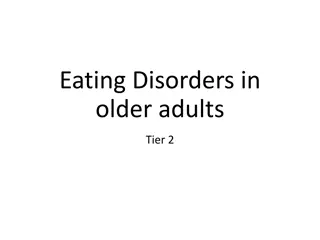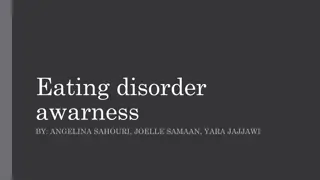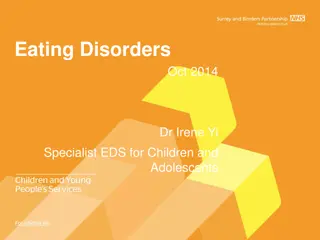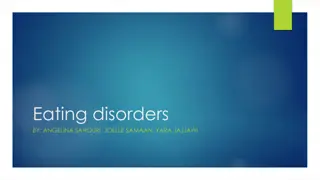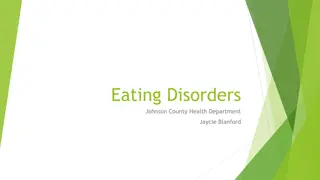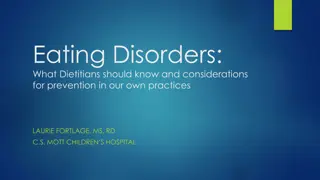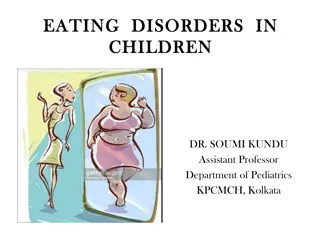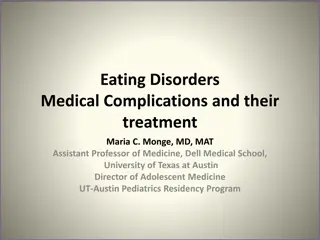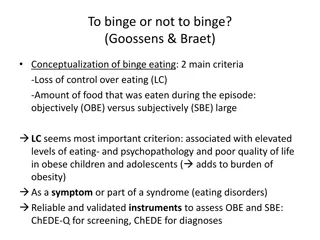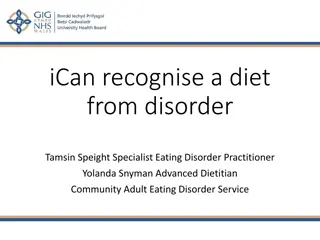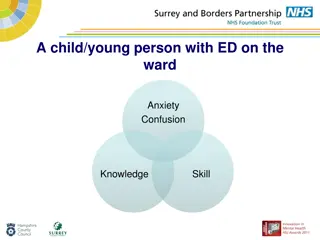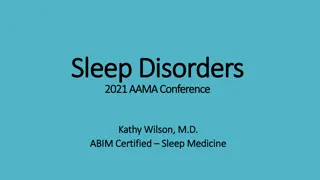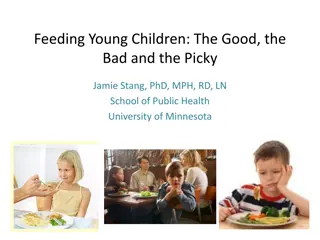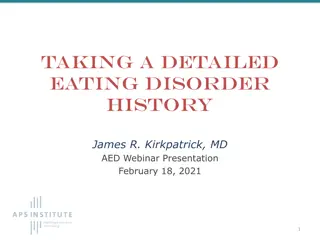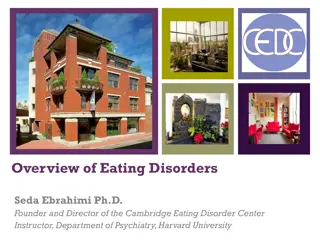Supporting Children and Young People with Eating Disorders: NHS England's Initiatives
NHS England's Children and Young People's Eating Disorders National Programme aims to improve access and waiting times for treatment. The program sets standards for prompt treatment based on NICE guidelines, with ongoing investments to enhance community models and inpatient care. Efforts also focus on equality, diversity, and inclusion in mental health services, with a strategic approach to address disparities and improve workforce diversity. The program emphasizes co-production, involving diverse voices in shaping mental health initiatives.
Download Presentation

Please find below an Image/Link to download the presentation.
The content on the website is provided AS IS for your information and personal use only. It may not be sold, licensed, or shared on other websites without obtaining consent from the author.If you encounter any issues during the download, it is possible that the publisher has removed the file from their server.
You are allowed to download the files provided on this website for personal or commercial use, subject to the condition that they are used lawfully. All files are the property of their respective owners.
The content on the website is provided AS IS for your information and personal use only. It may not be sold, licensed, or shared on other websites without obtaining consent from the author.
E N D
Presentation Transcript
Children and Young Peoples Eating Disorders National CYP MH programme NHS England and NHS Improvement
NHS England policy and guidance for CYP ED Eating Disorder Access and Waiting Time Standard (set in 2015/16 to be delivered by March 2021): 95% of CYP with an eating disorder should start National Institute of Clinical Excellence (NICE)-recommended treatment within 1 week if urgent, and 4 weeks if routine. Progress towards the standard is reported on a quarterly basis. Guidance published to support delivery of evidence-based community model, and extended in 2019 to improve integration with in-patient care. The model is more effective than continuing to deliver in generic Children and Young People s Mental Health (CYP MH) teams, and includes self referral. 30m per annum allocated to CCG baselines from 2016 in addition to money already spent by Clinical Commissioning Groups (CCGs) Additional investment of 11m in 2019-20 and a further 11m in 2020-21 was allocated in the Long Term Plan in recognition of rising referrals, and there is a continued need to increase staff capacity and capability but actual spend reported by CCGs did not increase. This may be a coding error during Covid-19. NEW: On top of the investment going into CCG baselines, 79 million additional funding announced by the Government (5 March 2021) to help up accelerate our CYP Mental Health (including eating disorder services) ambitions and address the pressures arising from the pandemic. 10m for CYP MH inpatient beds last winter included support for those with an Eating Disorder but principally by enhancing CYP ED community infrastructure and working on admission avoidance strategies. Actual spend is reported each year in Q4 reports on the NHS Mental Health Dashboard Funding ( million cash prices) 2016/17 2017/1 8 2018/19 2019/20 2020/21 2021/22 2022/23 2023/24 CYP Eating disorder CCG baseline additional allocation 30 30 30 41 52 53 53 54 Actual reported spend N/A 46.7 50.6 50.0* - - - - 2 | 2 | *may be a coding error during Covid as overall CYPMH rose above extra funding in the baseline.
Equality, diversity and inclusion in CYPMH Equality, diversity and inclusion in CYPMH Supporting local systems Working with clinical networks and other national teams to collate and share positive practice on advancing mental health equalities. This includes a case studies pack developed to inform future MHST delivery and implementation, including the need to address health inequalities and educational disadvantage. Started preparations with Young Minds to speak to CYP and parents/carers from ethnic minority backgrounds to inform the Patient and Carer Race Equality Framework The Advancing Mental Health Equalities strategy sets out the short-term actions that NHSE/I is taking with the support of the Advancing Mental Health Equalities Taskforce to create more equitable access, experience and outcomes in mental health services in England. Data and information Working with the Mental Health Infrastructure team to develop a plan to monitor and improve the quality of data for headline metrics (access and outcomes) for different demographic groups Planning to support local health systems to make better use of patient experience measures to address health inequalities and continually improve services Workforce Supporting the HEE CYP Mental Health New Roles Implementation Group to widen participation amongst groups underrepresented in the mental health workforce, starting in the Children s Wellbeing Practitioner and Education Mental Health Practitioner workforce The CYP MH programme is supporting this work by taking forward actions relating to four overall workstreams within the strategy (see right). Co-production Reviewing our approach to participation and co-production in the children and young people s mental health programme, with a focus on increasing the diversity of voices of children, young people, parents, carers and families in our work. We are exploring different models for how we deliver this, including by working with a range of voluntary sector organisations and through connecting with existing networks like the NHS Youth Forum and local parent/carer forums. 3 |
The evidence-based model Prevention and early identification with GPs, Schools / colleges many teams partner with vol. sector to support this work. A Evidenced model of delivery for the Eating Disorder Pathway including integration with inpatient care (medical ward and inpatient CYPMH) Ensure swift access to evidence based treatment as soon as an eating disorder is suspected; treatment for eating disorder alongside co-existing mental health or other needs B C Support intensive outreach, in-reach during admission or home treatment when required D Provide care before, during and post admission to medical ward or CYPMH unit Guidance and recommendations NICE, NHSE/I, QNCC-ED, Junior Marsipan and GIRFT report 4 | 4 |
Eating Disorder care when inpatient or day care is required (NICE guideline 2017; NHS Eng. ED addendum 2019) When care cannot be delivered in the community For those with physical health is severely compromised - admit to a medical inpatient or day patient service for medical stabilisation and to initiate refeeding (1.11.1) For those with ED and severe/acute mental health risk (such as significant suicide risk), consider psychiatric crisis care or psychiatric inpatient care (1.11.5) When reviewing need for day or inpatient care as part of an integrated treatment programme with CED Deliver care in age-appropriate facilities (for example, paediatric wards or adolescent mental health services). Should be near to their home and have the capacity to provide appropriate educational activities during extended admissions.(1.11.8) Do not use inpatient care solely to provide psychological treatment for eating disorders(1.11.4) Do not discharge people solely because they have reached a healthy weight (1.11.4) Maintain integrated care pathway by ensuring CED team keep in contact with the inpatient team: To advise on care and management, both during the admission and when planning discharge or transition to adult eating disorder services (1.11.7) Keep the person's family members or carers involved (1.11.7) To consider starting or continuing psychological treatments for the eating disorder (1.11.7) 5 |
Surge in CYP eating disorder cases during Covid-19 Progress Q1 2016/17 to Q4 2020/21 (SDCS data) Rise in demand and improved access but there is a significant surge in demand during Covid-19: National: Urgent cases Av % CYP within the ED standard Year No. starting urgent and routine treatment 800 100 80 600 60 400 40 2016/17 2017/18 2018/19 2019/20 5243 6867 7575 8034 72 80 82 77 200 20 0 0 Q2 19-20 Q1-18/19 Q1-16/17 Q2-16/17 Q3-16/17 Q4-16/17 Q1-17/18 Q2-17/18 Q3-17/18 Q4-17/18 Q2-18/19 Q3-18-19 Q4 18-19 Q1 19-20 Q3 19-20 Q4 19-20 Q1 20-21 Q2 20-21 Q3 20-21 Q4 20-21 77 2020/21 10,695 Compared to 2019/20, 2,661 more CYP started treatment in 2020/21 N completed urgent pathways % urgent national CYP within 1W National: Urgent cases Increase in the number requiring treatment (no. starting and still waiting to start treatment) over the last 12 months was: - 129% for urgent treatment - 60% for non-urgent/routine treatment 800 100 80 600 Increase evident across all regions with significant pressures in Midlands, North West, East of Eng, and London. 60 400 40 200 20 CYP Community Eating Disorder Teams continue to deliver treatment using remote ways of working for individual and family interventions alongside face to face appointments when required. Includes working with primary, community, schools/FE colleges to help identify CYP who may be at risk of relapse during Covid-19 and lockdown. 0 0 Q1-16/17 Q2-16/17 Q3-16/17 Q4-16/17 Q1-17/18 Q2-17/18 Q3-17/18 Q4-17/18 Q1-18/19 Q2-18/19 Q3-18-19 Q4 18-19 Q1 19-20 Q2 19-20 Q3 19-20 Q4 19-20 Q1 20-21 Q2 20-21 Q3 20-21 Q4 20-21 N completed urgent pathways % urgent national CYP within 1W Statistics Children and Young People with an Eating Disorder Waiting Times (england.nhs.uk) 6 | www.england.nhs.uk
Inpatient CYPMH - Eating Disorders Roll out of provider collaboratives to strengthen place based commissioning- implementation of outcomes framework (Impact) GIRFT deep dive visits to support quality improvement Clinical Reference Group (CRG) and Complex Eating Disorder Working Group supportingChildren & Young Peoples Quality Improvement Taskforce and improve integrated care across the whole pathway. All Age Eating Disorder Reducing Restrictive Practice Guidance focus is on prevention, reducing restrictive practice (July 2021) Feeding Under Restraint - National Audit (due to start January 2021 with a completion date of July 2022) to understand the restrictive practice associated with different eating disorder presentations in NHS and Independent sectors and experience of service users and families. inform and develop national guidelines by the CRG Avoidant Restrictive Food Intake Disorder (ARFID) in Autistic People briefing developed with lead academics and this is being used to support Designing and delivering training nationally for those o working in eating disorder services (and other services where eating difficulties are seen), on how to recognise autism and adapt existing evidence-based interventions so that they are suitable for autistic people; o half day autism training is being rolled out to all CYPMH inpatient units (Oliver McGowan training); train the trainer specification being developed for 2-day autism training for all inpatient units, which is to commence from April 2021; Fostering closer links between NHS LD and Autism services and eating disorder services, so that expertise can be shared. 7 | www.england.nhs.uk
Clinicians views on surge during Covid-19 Issues raised by clinicians and evidenced in the data are CYP are presenting with higher levels of physical and mental health complexity and risk with some requiring immediate in-patient admission (e.g. physical health at risk requiring urgent medical stabilisation). Pressures on holding patients on paediatric wards (beyond the planned 2 week stay for medical stabilisation) and challenge around onward admissions to inpatient CYPMH units to meet demand for urgent inpatient CYPMH treatment. Insights on reasons for the increase: The only available information is anecdotal based on what clinicians are consistently reporting. CYP with an eating disorder can be ambivalent about having a problem, and family and friends may be unaware of their deterioration Lockdown is causing anxiety and depression, and CYP not eating due to loss of appetite or because it is something they can control Issues at home during lockdown, potentially exasperating an emerging eating disorder. On the reopening of Schools, some teachers spotted stark deterioration and intervened to support a referral. Dr Mima Simic (SLAM CYP ED service) stated that: Covid-19 has presented the perfect storm of unpredictability and loss of control; lockdowns and loss of daily structure; unhelpful health campaign to lose weight. 8 | www.england.nhs.uk
Support and future work Actions underway to support services Work with regions and clinical networks to: Support the significant pressures and capacity issues across the system NHS E/I national CYP ED webinars 25 Feb 2021 and for CYP MH Provider Collaborative Forum 18 Mar 2021 To be followed by an RCPCH webinar to emphasise CYP community ED teams and Paediatrics integration Training opportunities for new/existing MDT staff (roll out of HLP Paediatric Critical Care E-portal for hospital staff to complete e-learning on eating disorder and self-harm modules) Focused work on eating disorders within physical and mental health integration workstream. Release of the Eating Disorder Dashboard on Children and Young People's Eating Disorders - FutureNHS Collaboration Platform to help improve data flow and quality to the MHSDS. Whole pathways, including inpatient beds - extension of New Models of Care/Provider Collaboratives continues to drive integrated pathways (21 CYP MH NHS-led Provider Collaboratives) Future work planned: National joint programme of work between CYPMH and CYP Transformation CYPMH in UEC and acute environments to support closer integration between MH and acute colleagues National All Age Eating Disorder Audit (data collection to start 2022/23) Review CYP CED workforce data from the NHS Benchmarking 2020-21 CYP MH workforce data collection (Aug 2021) NHSE/I continues to work with regional and integrated care systems (ICSs) mental health leads and their CYP Eating Disorders Clinical Networks with HEE, NHSE/I Specialised Commissioning national and regional leads, NHS System Improvement Team (SIT), CYP Transformation team to a) support local services and b) help ensure the funding flows to these services as intended to deliver the standard and evidence-based model, including integration with inpatient settings (local paediatric/medical wards for medical stabilisation and/or inpatient CYP mental health settings when required). 9 | www.england.nhs.uk
Training available Whole Team Training: Evidence-based whole team training is available for providers to commission directly from the supplier as teams change. During the pandemic, regions with providers, are commissioning a refresh 2-day programme to support teams. Staff Training: Teams will continue to need to recruit new staff who are trained to deliver evidenced interventions HEE has funded Systemic Family Practice for Eating Disorder and Cognitive Behavioural Therapy (CBT) for Eating Disorders for 2020-21 but going forward providers need to work with HEE regional leads to support the above and other relevant training for new and existing staff within CYP eating disorder teams. CYP with Avoidant Restrictive Food Intake Disorder (ARFID) - we tested adaptation of the service offer, assessment and treatment to meet the needs of CYP with ARFID recognising the level of demand for this client group. Training is now available for providers to commission in order to support adaptions to their care pathway (2 day intensive course - see https://mccaed.slam.nhs.uk/professionals/events/ ) Working with NHS England s CYP Transformation team and Public Health England to improve care for CYP who experience health issues linked to being severely overweight/obese. 10 | 10 |
MindEd for Families Resource for all adults to increase awareness and understanding Includes free e-learning sessions for all those working with CYP (incl. ED sessions) https://www.minded.org.uk/ E. Resources for children, young people, families and practitioners Beat work to improve awareness and understanding in schools and with GPs; individual and parent support services. Healthy London Partnerships Guidance for GPs and Schools is being adapted for other areas with the support of Clinical Networks for Eating Disorders Eating Disorder Awareness: Guidelines for referring CYP HLP Paediatric Critcial Care in Practice (PCCP) E-learning portal for medical staff on treating CYP who present with eating disorder (completed by 900 medical and nursing staff across 30 London Hospitals) Junior MARISPAN App Free online learning tool We can talk to improve the care delivered for CYP presenting to hospital in a mental health crisis. Oliver McGowan training for health and social care staff to receive learning disability and autism training at the right level for their role. 11 | www.england.nhs.uk
Thank you & Questions 12 | 12 |
